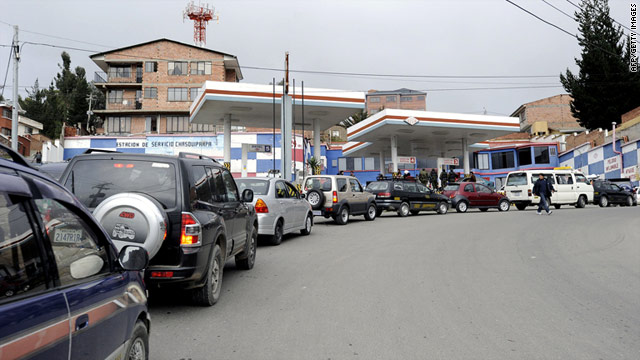Truth Vibrations
New member

Bolivians line up at a gas station in La Paz on December 26, 2010.
[video]http://cnn.com/video/?/video/world/2010/12/29/romo.bolivia.gas.prices.cnn[/video]
Bolivian President Evo Morales on Thursday defended his decision to end fuel subsidies, a move that caused gasoline and diesel prices to spike and has led to protests in major cities since it was announced over the weekend.
The country's subsidies led to an artificially low price for diesel and gasoline, which resulted in widespread smuggling of those products to neighboring countries, where smugglers sold it for a profit, Morales told CNN en Español. "There's a tremendous amount of smuggling (to Peru and Brazil) and the state loses."
For example, Bolivia will spend $660 million this year importing fuel, of which $380 million will have been subsidized by the government, he said. Of that, he said, $150 million will have been siphoned out of the country through contraband sales of the gasoline and diesel in neighboring countries, where the price is higher. "For a small country like Bolivia, that's a lot of change," he said.
Morales' remarks came a day after he attempted to explain the move in a nationally televised address.
Though the initial price shock may seem high, the average Bolivian will benefit from the move, he said. Money saved under the new policy will be plowed back into the economy, with 20 percent increases in the minimum wage and spending in education, health, and security, he said.
"Our policies are always to favor the poor people," said Morales, the nation's first indigenous president. For those people who will not be helped by the salary increases, he said, "the only way (to help them) is to create new jobs."
He acknowledged that transportation costs in some areas have doubled since Sunday, when his government announced he was ending the subsidies, but blamed unscrupulous Bolivians for the increases.
"Evidently, there are some people in transportation who take advantage of this situation and increase their fares by 100 percent," said the president. Government studies indicate that public transportation fares should have increased by no more than 30 percent, he said.
In El Alto, hundreds of people -- most of them young -- gathered outside government buildings, breaking windows and dismantling a protective fence in front of one. In the afternoon, demonstrators broke windows at the mayor's office, pelted cars whose drivers dared drive in the area, and set parked cars afire.
In Santa Cruz, hundreds of demonstrators broke into one government building and hauled files from the offices to the street, where they set them ablaze. In some areas, demonstrators blocked traffic for brief periods until they were dispersed by police. Once the police had left, they would do it again, according to a reporter for ATB Bolivia.
Asked about protests in the streets of major cities like La Paz, the capital, Morales questioned the use of the word "massive" to describe them. "The information I have is some 5,000 Bolivians" have demonstrated. He suggested that his opposition was mobilizing the protests for political gain.
"This will stabilize," he said. "I have a lot of faith."
Morales also said his government will seek to counter the impact of the price increases by investing $300,000 per rural municipality across Bolivia to spur economic growth through the creation of infrastructure projects with an emphasis on irrigation.
Gasoline prices rose by as much as 73 percent and diesel by 83 percent Monday. Subsidies had kept the price of gasoline at about 50 cents per liter ($1.88 per gallon). By comparison, neighboring Peru sells gasoline at $1 per liter and Brazil at $1.58 per liter.
The president of the Confederation of Private Business People, Daniel Sanchez Solis, disputed Morales' assertion that the business sector had orchestrated the demonstrations. "He's badly informed," Sanchez told CNNE. "He is attacking the private sector, which is the sector that has shown responsibility."
For example, he said, the Association of Banks, which is a member of his organization, calmed rumors Wednesday of an imminent financial crisis that could have led to a run on the nation's banks.
Sanchez added that the vast majority of employees in the country will not be affected by Morales' 20 percent wage increase, and he worried aloud that the move would result instead in higher inflation.
"The invisible hand of the market has returned to the country," he said. "The free market."
Sanchez said he was not opposed to raising the price of petroleum products, but he criticized what he said was Morales' failure to consult with other sectors prior to acting. "Why not build among all of us a productive policy?" he asked. "We want to build a country. We want to participate."
